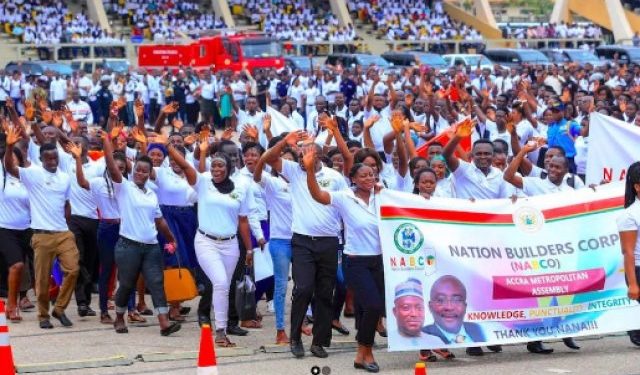The Nation Builders Corps (NaBCo) policy, launched in May 2018 with the aim of providing training and employment opportunities for over 100,000 graduates, has become a contentious issue in Ghana.
Despite initial promises of a game-changing initiative, the policy now hangs as an albatross around the neck of the government. Recent developments have shed light on the discontent among NaBCo trainees, who are demanding immediate action after Vice President Dr. Mahamudu Bawumia’s promise to address their concerns remains unfulfilled.
A Flawed Strategy:
Ahead of the 2020 elections, the NaBCo policy was strategically showcased by the New Patriotic Party (NPP) through billboards featuring NaBCo trainees throughout Ghana.
However, the individuals used for the ads later expressed regret at being used as political advertising puppets, raising questions about the policy’s true impact and relevance.
Voices of Dissatisfaction:
Restlessness among NaBCo trainees grew as concerns over delayed allowances and doubts about the program’s long-term sustainability took center stage.
Frustrated by the lack of action, trainees took to the streets in protest, demanding answers and resolution to their financial struggles. Despite the discontent and outcry, Minister of State at the Office of the President, Freda Akosua Prempeh, maintained that NaBCo has been successful.
Broken Promises:
As the NaBCo policy expired in September 2022, more than 57,000 trainees found themselves unemployed, casting doubt on the program’s effectiveness and long-term viability.
In an attempt to appease the trainees, Vice President Dr. Mahamudu Bawumia promised to address their concerns during a town hall meeting in the Oti Region on June 2, 2024. He committed to paying their nine-month arrears, offering hope to the struggling graduates.
Unfulfilled Anticipation:
The trainees eagerly awaited the fulfillment of the Vice President’s promise, hoping for a resolution to their financial struggles.
However, weeks have passed without any tangible action taken, leaving the trainees disappointed and frustrated.
In a letter dated June 24, 2024, they expressed their disillusionment, questioning whether the Vice President’s words were mere rhetoric or a genuine effort to address their grievances.

Uncertain Future:
As uncertainty looms over the fate of NaBCo trainees, it remains to be seen whether the government will take concrete steps to fulfill its promises.
The trainees’ demand for immediate action reflects the urgency of their financial situation and their desire for a fair and just resolution.
Only time will tell whether the government will heed their pleas and provide the necessary support.
Conclusion:
The NaBCo policy, once hailed as a game-changer, has become a contentious issue in Ghana. The discontent among NaBCo trainees, who are demanding the fulfillment of Vice President Bawumia’s promises, highlights the challenges faced by the government in addressing the concerns of its citizens.
As Ghana awaits a resolution, it is crucial for the government to take swift and tangible action to address the grievances of the trainees and ensure a fair and sustainable future for all those affected by the NaBCo policy.
By Wisdom Sarfo













